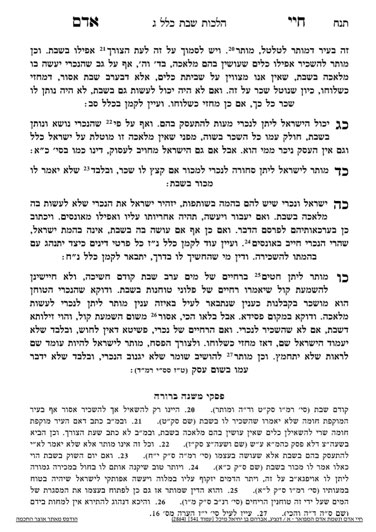We are beginning siman 23. The Chayei Adam continues to discuss shutfus, as he discussed in siman 21.
In a scenario where a business is buying and selling and generating a profit, there needs to be an arrangement from the beginning of the partnership in a way which gives the profits from Shabbos to a non-Jew. The Jew can work a different day of the week in exchange for the non-Jew working on Shabbos (see S0092-93).
However, if the shutfus is such that the Jew provides the capital, and the non-Jew does all of the work, there is no issue. Even if the non-Jew works on Shabbos, he is not working to address the responsibility of the Jew, but out of his own choice. Therefore, the Chayei Adam writes that a Jew can give a non-Jew money for the non-Jew to invest, even if the non-Jew works on Shabbos, and they can split the profits. The Chayei Adam explains that the Jew has no responsibility to do work, so there is no issue of the non-Jew working for the Jew (as opposed to the previous cases, where the Jew had a responsibility to do work, and the non-Jew was working in his stead). Additionally, there is no issue of maris ayin, because there is nothing which ties the work of the non-Jew back to the Jew. However, if they are both working, even if only one provided capital, we treat it like the previous cases, and they would have to create an arrangement in which the Jew has no responsibility at all to Shabbos.
In siman 24, the Chayei Adam writes that if the Jew provides merchandise, which the non-Jew sells, it is not problematic. They would need to make an arrangement in which the non-Jew is a kablan (i.e., the non-Jew is working for himself rather than for the Jew) and there is a ketzitzah, and the Jew cannot specifically instruct the non-Jew to sell on Shabbos.
The MIshnah Berurah points out that if the best day (or only day) to sell these items is on Shabbos, even if the Jew does not give the non-Jew specific instructions, it is the equivalent of the Jew explicitly instructing the non-Jew to sell on Shabbos, and is assur.
Summary
When a Jew and non-Jew are business partners, the Jew cannot have the non-Jew work on Shabbos.
To address this issue, they should stipulate before beginning the partnership that the non-Jew works and retains the profits from Shabbos, and the Jew works and retains the profits from a corresponding day during the week. This the business does not belong to the Jew on Shabbos.
If the Jew provides all of the capital but does not do any of the work, there is no issue regarding amira l’achum. However, if the Jew does any work whatsoever, they would need to create the above arrangement.
If the Jew provides merchandise for the non-Jew to sell, they must create an arrangement in which the non-Jew is a kablan, and the Jew cannot give specific instructions that the non-Jew sell on Shabbos. If the main day to sell the merchandise is Shabbos, it is as though the Jew gave explicit instructions even if he did not say anything.



